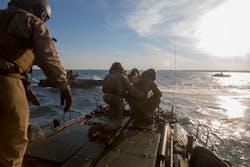Machine autonomy experts at Martin Defense to design unmanned amphibious vehicle to deliver fuel to Marines
ARLINGTON, Va. – Machine autonomy experts at Martin Defense Group LLC in Honolulu are designing an unmanned amphibious vehicle to help deliver fuel to U.S. Marines fighting on attack beaches.
Officials of the U.S. Office of Naval Research in Arlington, Va., announced a $15 million contract to Martin Defense last week for the Amphibious Vehicle for Unmanned Surface Mobility (AVUSM) project.
The AVUSM system is to enable the U.S. Marine Corps autonomously to deliver a lay-flat fuel line hose from an embarkment platform floating offshore, through the surf-zone, to dry land on attack beaches.
This unmanned amphibious vehicle is to deliver a sustained fuel supply for armored combat vehicles, electric generators, and logistics operations for Marines who are fighting their way inland from attack beaches.
Martin Defense also is working with the U.S. military on a $54.8 million project to develop enabling technologies for future large-size unmanned underwater vehicles (UUVs) with long endurance and large payload capacity, as part of the Manta Ray program of the U.S. Defense Advanced Research Projects Agency (DARPA).
Manta Ray is to open a design space for future UUVs that are capable of long-duration missions and large payload capacity, as well as to advance key technologies that will benefit other naval designs such as low-cost UUV operations, long duration undersea power management, biofouling reduction, and long-duration navigation.
The Manta Ray program seeks to demonstrate critical technologies for a new class of long-duration, long-range, payload-capable UUVs to give extra capacity to military commanders without disrupting their operations. Key aspects of the Manta Ray program are classified.
Manta Ray also will investigate mission-management technologies for extended UUV operations; high-efficiency undersea navigation; and new ways to mitigate biofouling, corrosion, and other material degradation for long-duration missions.
Martin Defense specializes in machine autonomy solutions for amphibious vehicles, as well as aerial, ground, surface, and undersea vehicles that must operate in combat conditions.
The company's core expertise involves cognitive systems for artificial intelligence (AI)-based autonomy that enables uncrewed vehicles to perform high-level reasoning and adapt to unexpected events, Martin Defense officials say.
Martin Defense Group autonomy research seeks to embed intelligence and reasoning on unmanned vehicles to enable operators to manage several unmanned vehicles at once.
Martin Defense also develops digital twins of systems and subsystems on U.S. military platforms for hull structural health monitoring, self-healing autonomous machinery, and smart electrical grids.
Related: New designs in autonomous submersibles for military applications are setting new standards
Martin engineers seek to apply the company's understanding of AI and machine learning to the development of efficient and accurate virtual worlds.
This contract to Martin Defense was procured competitively under the Office of Naval Research long range broad agency announcement (BAA) for Navy and Marine Corps science and technology. On this contract Martin Defense will do the work in Honolulu, and should be finished by April 2025.
For more information contact Martin Defense Group online at https://mdefensegroup.com, or the Office of Naval Research at www.onr.navy.mil.
About the Author
John Keller
Editor-in-Chief
John Keller is the Editor-in-Chief, Military & Aerospace Electronics Magazine--provides extensive coverage and analysis of enabling electronics and optoelectronic technologies in military, space and commercial aviation applications. John has been a member of the Military & Aerospace Electronics staff since 1989 and chief editor since 1995.
